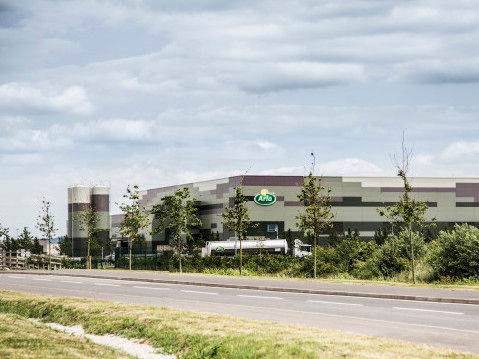Arla Foods eyes further growth with 527 million euro investment
Advertisement
The farmer-owned dairy cooperative Arla Foods has announced a plan to invest over half a billion euro in 2018 as the company continues to deliver on its 2020 growth ambition.
The executive management’s decision to significantly increase the investments of the company was approved at a meeting in London this week by Arla Foods’ board of directors, which consists mainly of elected farmer owners. Arla Foods will invest in new, expanded and improved production capacity as well as innovative technology.
Chairman of Arla Foods Åke Hantoft underlines that all investments by Arla Foods are made to secure long-term growth and profit opportunities for the company’s 11,200 farmer owners across Europe.
“Arla has a history of good investments for sustained growth. The board of directors has decided to increase our investments with this plan, because we have identified new projects and investments with short and long term potential for significant return. The business growth these investments will create for our company will generate growth opportunities for our farmer owners. We see these investments as essential to the future of our business,” says Åke Hantoft.
Having grown the business by 50 per cent, in the last decade, Arla, which now operates in 120 countries word wide is focusing its investment in four key areas:

Arla Foods eyes further growth with 527 million euro investment
Arla Foods
-
Meeting the growing demand for dairy
Healthy and natural products that match consumer lifestyles
Leading the way in Whey
Sustainable food production that considers the future of our planet
While global milk production continues to be volatile, dairy consumption worldwide is growing faster than it ever has, and Arla Foods has extensive growth opportunities as it embraces the challenge to meet the growing demand for dairy.
50 per cent of the investments in 2018 are targeted projects aimed at growing Arla Foods’ sales outside Europe, where the company’s fastest growing strategic growth markets are Middle East and North Africa, China and Southeast Asia, Sub-Saharan Africa, and the United States.
Two thirds of this year’s spend will focus on increasing Arla’s European production capacity, with 266 million euro being invested in Denmark, 82 million in the UK, 78 million in Sweden, and 65 million in Germany and 36 million for production in other countries.
Commenting on the investment plan Peder Tuborgh, CEO, Arla Foods says, “This investment plan is a growth plan aimed at expanding our positions in key dairy categories and geographic markets where Arla is already a key player. Our ambition is to create an even stronger foundation for our farmer owners and our future business growth.”
New Lactofree production in UK
Continued investment in healthy and natural products that match consumer lifestyles feature strongly in Arla Foods’ investment plan. The investments come as Arla Foods continues to deliver on the major food trends influencing consumer demand for health dairy products as part of a natural and balanced diet.
Having led the way in Lactofree dairy production, Arla will use its experience from its Scandinavian markets and a 56 million euro investment to lay the foundations for the production of Lactofree products at its Aylesbury site in the UK.
In Southeast Asia and Sub-Saharan Africa, disposable income is increasing and families are increasingly demanding nutritious dairy products. To be able to supply the increasing demand, Arla plans to expand its production site in Pronsfeld, Germany that supplies milk powder and UHT milk for many of Arla Foods’ strategic growth markets outside Europe.
The investment in 2018 is 10 million euro, with another estimated 180 milion euro over the next two years. The project will add another milk drying tower to the existing production of milk powder in Pronsfeld, and construction is planned to start in late 2018, subject to all governmental approvals. It is expected to be ready for production in 2021.
Leading the way in whey
Arla Foods is known in the dairy industry as a strong innovator working continuously to increase the quality and value of its production, and several of the projects in the investment plan reflect this.
With its subsidiary Arla Foods Ingredients, the company has taken a by-product once cast aside from cheese production and is now leading the way in whey with high-quality value-added whey protein ingredients for food industry customers around the world.
Once again, Arla Foods Ingredients is a recipient of large investments by its parent company as Arla Foods will invest more than 100 million euro in new, groundbreaking technology and capacity expansions for its production of natural whey protein ingredients for the global food industry.
In Sweden a further five million euro will be invested by Arla Foods to add a whey processing capacity at Falkenberg dairy that can concentrate the whey from the site’s cottage cheese production and add more value through Arla Foods Ingredients.
Pursuing renewable energy sources
In line with the significant targets on sustainability set by Arla Foods in its Good Growth 2020 strategy the investment plan supports 46 projects and a total of 15 million euro delivering responsible investment for the long term future of our planet.
The projects will help Arla Foods reduce its carbon emissions and help the company pursue its goal to ensure that at least half the energy Arla Foods uses must come from renewable sources like biomass, wind and water by 2020.
An example of this is the construction of a large biogas facility by Arla’s dairy site in Nr. Vium, Denmark, which will supply heat for the production of milk powder.























































